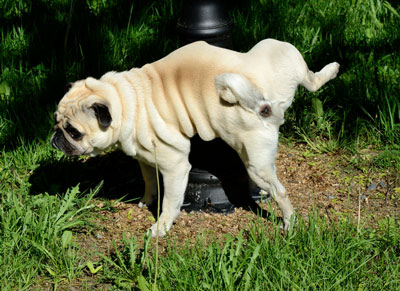Urine Marking in Dogs

Urine marking is a common behavior in dogs, especially males. By depositing urine on different surfaces, a dog leaves scent markers that communicate to other dogs. Urine marking is mostly a way for dogs to mark their territory.
Urine Marking Is Communication for Dogs
When you are out taking a walk and your dog is sniffing around everywhere and leaving small amounts of urine on various surfaces, he is communicating with dogs that have already urinated in those spots and those that will come later to sniff around.
It turns out that dogs can glean a wealth of information from sniffing the urine of other dogs. They can probably discern each other's sex, health status, and even mood.
You can learn more about dogs and what they learn from urine here: "You Have E-Mail; Your Dog Has P-Mail."
Territorial Marking Is Most Common in Intact (Un-neutered) Male Dogs
We've all seen a male dog lifting his leg up to urinate on something. This commonly begins around 6-8 months of age in male dogs, when they hit puberty. If a dog is neutered before he begins lifting his leg to mark things, the behavior may never develop. If he's neutered after he begins lifting his leg, the surgery may end the behavior, but not always.
Some dominant female dogs will also lift their legs to mark territory, but it's not terribly common. Still, un-spayed female dogs urine mark by squatting much more frequently than spayed females do. They are leaving information about where they are in their estrus cycle: they're advertising to neighborhood male dogs.
Note: dogs also use feces and scratching at the ground to communicate information about territory to other dogs.
What to Do When Dogs Mark Inside the House
When dogs mark their territory outside, it's not usually much of a problem for the owner. However, some dogs urine mark inside, and then something must be done. Here's what to do if your dog is urinating in the house:
- Visit the veterinarian. Not all urinating is marking, and dogs frequently have urinary accidents in the house when they are suffering from various medical conditions including urinary tract infections, bladder stones, kidney disease, and diabetes. Take a look at this article to learn more: "Causes of Frequent Urination and Urinary Accidents in Dogs."
- Make a spay or neuter appointment. Spaying or neutering will solve the vast majority of marking problems in dogs.
- Clean the mess up properly. It's crucial that you clean all urine spots appropriately. Otherwise, your dog will want to continue to mark that spot. Use an enzymatic cleaner to break down the odors and resolve them. You can learn more here: "Cleaning Dog Urine."
- Evaluate your dog's stress levels. Neutered dogs that begin urine marking inside are often feeling stressed about something. This could be a new pet or person in the home or a neighborhood dog hanging around outside. In these cases, desensitization therapy to get the dog used to the new pet or person, strategies for keeping other dogs away from your home such as a fence, and stress-relieving techniques like using Adaptil spray, collar, or diffuser can be helpful.
- Prescription medications may be necessary. There are rare instances where medications to help with anxiety may be required while you work on other strategies to help your dog. Your veterinarian is best suited to help you decide whether this is necessary and safe for your dog. Never give your dog any human or canine over-the-counter or prescription medication without your veterinarian's input.
You May Also Like These Articles:
Urinary Incontinence: Causes of Urine Leaking in Dogs
Causes of Frequent Urination and Urinary Accidents in Dogs
You Have E-Mail; Your Dog Has P-Mail
Why Dogs Like to Roll in Yucky Stuff
Disclaimer: This website is not intended to replace professional consultation, diagnosis, or treatment by a licensed veterinarian. If you require any veterinary related advice, contact your veterinarian promptly. Information at DogHealth.com is exclusively of a general reference nature. Do not disregard veterinary advice or delay treatment as a result of accessing information at this site. Just Answer is an external service not affiliated with DogHealth.com.
Notice: Ask-a-Vet is an affiliated service for those who wish to speak with a veterinary professional about their pet's specific condition. Initially, a bot will ask questions to determine the general nature of your concern. Then, you will be transferred to a human. There is a charge for the service if you choose to connect to a veterinarian. Ask-a-Vet is not manned by the staff or owners of DogHealth.com, and the advice given should not delay or replace a visit to your veterinarian.



